
The Napoleonic Wars (1803–1815) were a series of conflicts fought between the French First Republic (1803–1804) and First French Empire (1804–1815) under the First Consul and Emperor of the French Napoleon Bonaparte and a fluctuating array of European coalitions. The wars originated in political forces arising from the French Revolution (1789–1799) and from the French Revolutionary Wars (1792–1802) and produced a period of French domination over Continental Europe. The wars are categorised as seven conflicts, five named after the coalitions that fought Napoleon, plus two named for their respective theatres: the War of the Third Coalition, War of the Fourth Coalition, War of the Fifth Coalition, War of the Sixth Coalition, War of the Seventh Coalition, the Peninsular War, and the French invasion of Russia.

The Second Bourbon Restoration was the period of French history during which the House of Bourbon returned to power after the fall of Napoleon in 1815. The Second Bourbon Restoration lasted until the July Revolution of 26 July 1830. Louis XVIII and Charles X, brothers of the executed King Louis XVI, successively mounted the throne and instituted a conservative government intended to restore the proprieties, if not all the institutions, of the Ancien régime. Exiled supporters of the monarchy returned to France but were unable to reverse most of the changes made by the French Revolution. Exhausted by the Napoleonic Wars, the nation experienced a period of internal and external peace, stable economic prosperity and the preliminaries of industrialization.

Napoleon III was President of France from 1848 to 1852 and then Emperor of the French from 1852 until his deposition in 1870. He was the first president, second emperor, and last monarch of France.

Napoleon Bonaparte, later known by his regnal name Napoleon I, was a French military officer and statesman who rose to prominence during the French Revolution and led a series of successful campaigns across Europe during the French Revolutionary and Napoleonic Wars from 1796 to 1815. He was the leader of the French Republic as First Consul from 1799 to 1804, then of the French Empire as Emperor of the French from 1804 to 1814, and briefly again in 1815.

The Hundred Days, also known as the War of the Seventh Coalition, marked the period between Napoleon's return from eleven months of exile on the island of Elba to Paris on 20 March 1815 and the second restoration of King Louis XVIII on 8 July 1815. This period saw the War of the Seventh Coalition, and includes the Waterloo Campaign and the Neapolitan War as well as several other minor campaigns. The phrase les Cent Jours was first used by the prefect of Paris, Gaspard, comte de Chabrol, in his speech welcoming the king back to Paris on 8 July.

The Second French Empire, officially the French Empire, was the government of France from 1852 to 1870. It was established on 2 December 1852 by Louis-Napoléon Bonaparte, president of France under the French Second Republic, who proclaimed himself Emperor of the French as Napoleon III. The period was one of significant achievements in infrastructure and economy, while France reasserted itself as the dominant power in Europe.
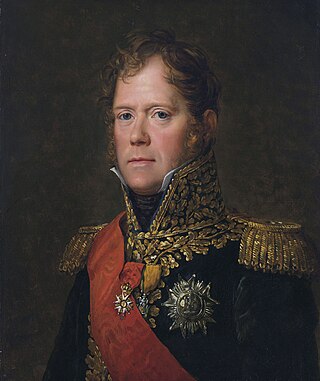
Michel Ney, 1st Prince de la Moskowa, 1st Duke of Elchingen, was a French military commander and Marshal of the Empire who fought in the French Revolutionary Wars and the Napoleonic Wars.
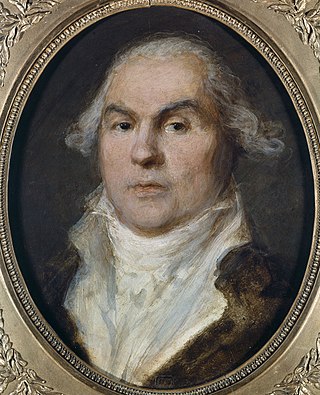
Jean-Jacques-Régis de Cambacérès, Duke of Parma, was a French nobleman, lawyer, freemason and statesman during the French Revolution and the First Empire. He is best remembered as one of the authors of the Napoleonic Code, which still forms the basis of French civil law and French-inspired civil law in many countries.

The Constitution of the Year VIII was a national constitution of France, adopted on 24 December 1799, which established the form of government known as the Consulate. The coup of 18 Brumaire had effectively given all power to Napoleon Bonaparte, and in the eyes of some, ended the French Revolution.

The Kingdom of Etruria was an Italian kingdom between 1801 and 1807 that made up a large part of modern Tuscany. It took its name from Etruria, the old Roman name for the land of the Etruscans.

A referendum concerning the establishment of the French Empire was held in France in June 1804. The result showed a virtually unanimous French electorate approving the change in Napoleon Bonaparte's status from First Consul to Emperor of the French, although the votes are assumed to have been manipulated.

A referendum ratifying the new constitution of the Consulate, which made Napoleon Bonaparte First Consul for life, was held on 10 May 1802. The question asked to the voters was: "Should Napoleon Bonaparte be consul for life?". Out of an electorate of 7 million, 3,653,600 voted in favor, and 8,374 voted against.

A referendum ratifying the constitution of the French consulate was held in February 1800. The official results, as announced by Lucien Bonaparte, Minister of the Interior and brother of First Consul Napoleon Bonaparte, were 99.9% in favor of the new constitution, with 53.74% of voters abstaining. However, evidence brought to light by the French historian Claude Langlois in 1972 demonstrated conclusively that Lucien massaged the votes in favor of the constitution, adding up to 20,000 'yes' votes in individual localities, and that there were therefore only some 1,550,000 actual votes for the change.

A referendum on re-establishing the Empire was held in France on 21 and 22 November 1852. Voters were asked whether they approved of the re-establishment of the Empire in the person of Louis Napoléon Bonaparte and family. It was approved by 97% of voters with an 80% turnout. As with other plebiscites under Napoleon III, the results were rigged and only served to legitimize their rule under a false sense of democracy.
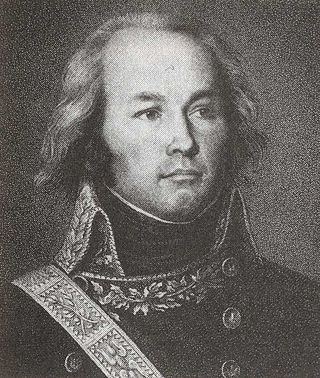
Claude Jacques Lecourbe was a French general during the French Revolutionary and Napoleonic wars.

The First French Empire or French Empire, also known as Napoleonic France, was the empire ruled by Napoleon Bonaparte, who established French hegemony over much of continental Europe at the beginning of the 19th century. It lasted from 18 May 1804 to 4 April 1814 and again briefly from 20 March 1815 to 7 July 1815, when Napoleon was exiled to St. Helena.
Between 1793 and 1815, under the rule of King George III, the Kingdom of Great Britain was the most constant of France's enemies. Through its command of the sea, financial subsidies to allies on the European mainland, and active military intervention in the Peninsular War, Britain played a significant role in Napoleon's downfall.
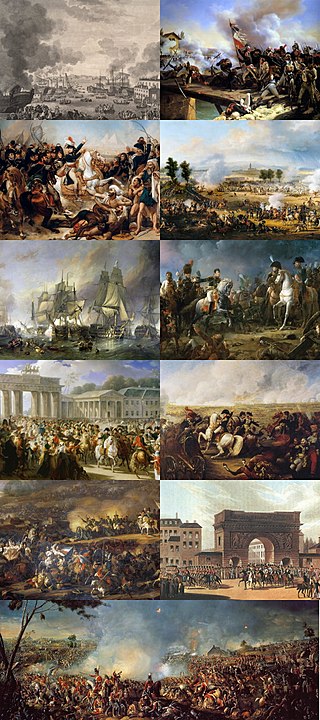
The French Revolutionary and Napoleonic Wars, sometimes called the Great French War, were a series of conflicts between the French and several European monarchies between 1792 and 1815. They encompass first the French Revolutionary Wars against the newly declared French Republic and from 1803 onwards the Napoleonic Wars against First Consul and later Emperor Napoleon Bonaparte. They include the Coalition Wars as a subset: seven wars waged by various military alliances of European powers, known as Coalitions, against Revolutionary France – later the First French Empire – and its allies between 1792 and 1815:
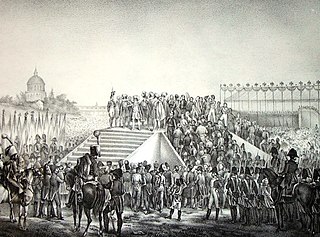
The Champ de Mai was a public assembly held by Napoleon on the Champ de Mars, Paris, a large open area near the École militaire, on 1 June 1815. This was during the Hundred Days, the period between Napoleon's return from exile and the restoration of the Bourbon kings following his failed Waterloo campaign. The objective of the Champ de Mai was to gather public support behind Napoleon's Charter of 1815, a constitutional reform that promised a more liberal government than under his earlier rule. The Charter was put to the citizens in a constitutional referendum and the results of this would be announced during the ceremony by representatives of the electoral college.















